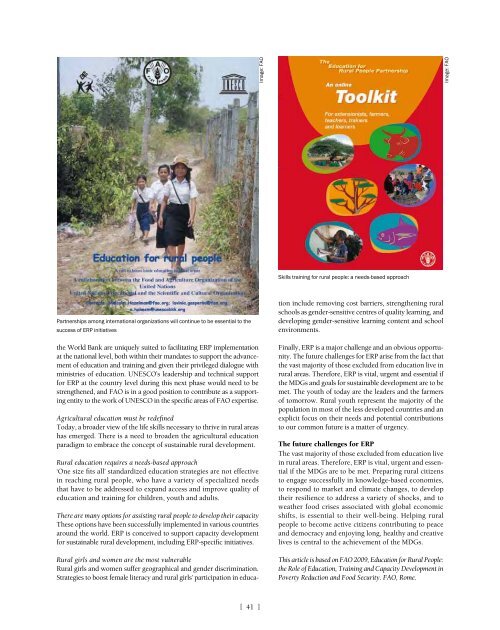Tomorrow today; 2010 - unesdoc - Unesco
Tomorrow today; 2010 - unesdoc - Unesco
Tomorrow today; 2010 - unesdoc - Unesco
Create successful ePaper yourself
Turn your PDF publications into a flip-book with our unique Google optimized e-Paper software.
Image: FAOImage: FAOSkills training for rural people: a needs-based approachPartnerships among international organizations will continue to be essential to thesuccess of ERP initiativesthe World Bank are uniquely suited to facilitating ERP implementationat the national level, both within their mandates to support the advancementof education and training and given their privileged dialogue withministries of education. UNESCO’s leadership and technical supportfor ERP at the country level during this next phase would need to bestrengthened, and FAO is in a good position to contribute as a supportingentity to the work of UNESCO in the specific areas of FAO expertise.Agricultural education must be redefinedToday, a broader view of the life skills necessary to thrive in rural areashas emerged. There is a need to broaden the agricultural educationparadigm to embrace the concept of sustainable rural development.Rural education requires a needs-based approach‘One size fits all’ standardized education strategies are not effectivein reaching rural people, who have a variety of specialized needsthat have to be addressed to expand access and improve quality ofeducation and training for children, youth and adults.There are many options for assisting rural people to develop their capacityThese options have been successfully implemented in various countriesaround the world. ERP is conceived to support capacity developmentfor sustainable rural development, including ERP-specific initiatives.Rural girls and women are the most vulnerableRural girls and women suffer geographical and gender discrimination.Strategies to boost female literacy and rural girls’ participation in educationinclude removing cost barriers, strengthening ruralschools as gender-sensitive centres of quality learning, anddeveloping gender-sensitive learning content and schoolenvironments.Finally, ERP is a major challenge and an obvious opportunity.The future challenges for ERP arise from the fact thatthe vast majority of those excluded from education live inrural areas. Therefore, ERP is vital, urgent and essential ifthe MDGs and goals for sustainable development are to bemet. The youth of <strong>today</strong> are the leaders and the farmersof tomorrow. Rural youth represent the majority of thepopulation in most of the less developed countries and anexplicit focus on their needs and potential contributionsto our common future is a matter of urgency.The future challenges for ERPThe vast majority of those excluded from education livein rural areas. Therefore, ERP is vital, urgent and essentialif the MDGs are to be met. Preparing rural citizensto engage successfully in knowledge-based economies,to respond to market and climate changes, to developtheir resilience to address a variety of shocks, and toweather food crises associated with global economicshifts, is essential to their well-being. Helping ruralpeople to become active citizens contributing to peaceand democracy and enjoying long, healthy and creativelives is central to the achievement of the MDGs.This article is based on FAO 2009, Education for Rural People:the Role of Education, Training and Capacity Development inPoverty Reduction and Food Security. FAO, Rome.[ 41 ]

















